Arushi Thakur, Suheil Murgai
Three lakh electric vehicles on the roads by 2020 would mean a reduction of over 16 lakh metric tons of pollution and savings of over Rs 3,700 crore (Rs 370 billion) in foreign exchange over the same period.
Go Green' is the motto for all leading economies of the world, as reflected by the increasing focus on electric vehicles. US President Obama has envisioned a target of one million electric cars on US roads by 2015 and allocated USD 2.4 billion to boost the development of electric vehicles.
Almost 17 European Union nations including UK, France, Belgium, Italy and Spain provide specific tax rebates to promote usage of electric cars. China has also joined the green initiative and has plans to produce one million electric vehicles annually by 2015.
...
Is India ready to drive in the green lane?
However in India, we are still testing the waters to understand the sustainability of these vehicles in the long run.
The Ministry of New and Renewable Energy has been the frontrunner in taking initiatives for promotion and adoption of electric vehicles.
In November 2010, the ministry formulated the Alternative Fuels for Surface Transportation Programme under which it provided 20 per cent subsidy to the manufacturers.
Prime Minister Dr Manmohan Singh also announced the formulation of an apex body, the National Council for Electric Mobility (NCEM) which would have representation by various ministries to devise a holistic policy for promotion of electric vehicles in the country.
...
Is India ready to drive in the green lane?
It is expected that under this initiative, the government will make regulations specific to financial incentives for manufacturers, parking and toll benefits to customers and research and development grants to build next generation technologies.
The Department of Heavy Industries is leading the initiative with Ministry of Urban Development, Ministry of Road Transport and Highways, Ministry of Science and Technology, Ministry of Finance and Ministry of Environment and Forests being the other bodies involved.
The key objective of the NCEM is to provide sustainable electric mobility to make electric vehicles a viable alternate vehicle by ensuring adequate support infrastructure for sufficient dissemination of electric vehicles.
The Union Budget also proposed full exemption from basic customs duty and a concessional rate of excise duty on batteries imported by electric vehicles manufacturers. All these recent developments highlight the growing emphasis of Indian government on encouraging the growth of electric vehicles.
...
Is India ready to drive in the green lane?
Photographs: Reuters/Ivan Alvarado
There is a need to develop India as a market which is currently at a nascent stage with Mahindra Reva being the only player in the electric vehicles space. Since inception of Reva Electric Car Company in 2001, till 2011, it had total sales of 5,000 cars with nearly 50 per cent domestic sales.
Reva is a very well established player globally and currently sells to about 24 countries and is looking to begin distribution in 40-50 countries in 2012. Other players who ventured the Indian market with hybrid technologies include Honda with Civic Hybrid and Toyota with Prius.
Honda Civic was not very successful since the product acceptability and consumer awareness was low during the time of launch in 2008. The Toyota Prius, which was launched in 2010, has had a slow market response owing to the current price.
...
Is India ready to drive in the green lane?
Photographs: Reuters
The main advantage of electric vehicles besides low pollution is that running cost of an electric vehicle is much lower vis-a-vis conventional vehicle. Also increasing crude oil prices are driving demand for these vehicles.
Electric vehicles are becoming popular among housewives and students who don't have stringent commuting requirements.
Once the supportive government policies are formulated the market for these vehicles would become developed.
Besides, India also has the maximum market potential owing to an established auto component infrastructure, low manufacturing and R&D costs, mechanical hardware availability, high urban congestion and the presence of a large domestic market.
...
Is India ready to drive in the green lane?
Photographs: Kim Kyung-Hoon/Reuters
Price positioning is the main concern for electric and hybrid vehicles, owing to the expensive battery costs.
Reva is priced at a price point which is comparable to other petrol-driven A-segment cars while similarly Toyota Prius is positioned in a price category which falls in the luxury segment.
The high price combined with low consumer awareness and environmental sensitivity is leading to the big question on whether India is ready for such vehicles.
In fact, most manufacturers are planning to launch vehicles in other countries or have already launched electric cars globally like Nissan with Leaf and Mitsubishi with iMiEV.
...
Is India ready to drive in the green lane?
Photographs: Mark Blinch/Reuters
However, they are playing it safe in India by watching the government movements and would eventually target Indian market only if the policies formulated under National Council for Electric Mobility are favourable.
Besides price, infrastructure is also another concern for electric vehicles in India. Since these cars can run approximately 80 km on one charge, they are recommended for short distances as charging infrastructure is not developed in the country.
There have been initiatives under which BSES in Delhi established charging ports in 50 locations across its sub-stations in the city. Likewise in Bangalore, parking spaces in malls and offices have been equipped with charging points for electric cars.
However, it is important to develop rapid charging stations which can provide quick charging in lesser time.
...
Is India ready to drive in the green lane?
Photographs: Mark Blinch/Reuters
The key challenge here is that for a developing country like India where we are struggling to deal with problem of electricity shortage, do we have enough resources to build charging infrastructure for electric vehicles.
Also it is difficult to assess in the long run, if we are trying to reduce the carbon footprint by decreasing the fuel-driven vehicles, or on the contrary are we burning more coal in the thermal stations to generate the required electricity for charging these vehicles.
As per statistics in India, transport contributes to 7 per cent of total greenhouse gas emissions while electricity contributes to 35 per cent.
Customer perception and outlook further pose the challenge of product acceptability in India. Electric vehicles are perceived to be under powered vehicles at higher cost.
...
Is India ready to drive in the green lane?
The cars can only cover short distance of about 80 km per charge and hence the value proposition for electric vehicle as a first car is also currently non-existent as compared to the petrol vehicle.
The whole phenomenon of electric vehicles have picked up in the recent years owing to the increasing oil prices and pressure on developed nations to reduce the carbon footprint.
It is interesting to note that electric vehicles were introduced in 1830s while back in 1900, a majority of the total vehicles in the US and the UK were electricity based. Thus it is certainly a case of reinventing the wheel with India still gearing up to join the green drive.
Globally, smart cities are being developed which are focused on promoting electric vehicles usage. Indian government is also planning four smart cities in Manesar, Shendra, Changodar and Dahej to be built along the Dedicated Freight Corridor.
...
Is India ready to drive in the green lane?
These cities are being designed in association with Japanese firms like Hitachi, Mitsubishi and Toshiba and would be would be based on successful models of Japanese cities Kitakyushu, Toyota City and Yokohoma.
Smart cities are going to be built under the main objective of 3-Rs: Recycle, Reuse and Reduce. It would focus on promoting energy-efficient facilities with networking function along with environmentally friendly public transportation system and personal vehicles.
Special purpose companies would be established for project implementation, operation, maintenance and management of smart cities.
Japanese corporations such as Hitachi, Mitsubishi, JGC Corp and Toshiba are working along with State and Central governments to design and build these eco-friendly smart cities.
...
Is India ready to drive in the green lane?
By 2020, India's population in cities is expected to grow manifold to a staggering 200 million while pollution is expected to grow by five times as compared to 2010.
With this tremendous growth has emerged a very critical issue of keeping air and noise pollution in urban areas under control.
It is desired to have 3 lakh electric vehicles on the roads by 2020, including three-wheelers, cars, and scooters which could result in a reduction of over 16 lakh metric tons of pollution by 2020, savings of over Rs 3,700 crore (Rs 37 billion) in foreign exchange and significant health costs savings.
Government initiatives are going to be one of the major drivers for bridging the gaps between consumers and electric cars manufacturers.
...
Is India ready to drive in the green lane?
Photographs: Stefan Wermuth/Reuters
Reduction in cost of vehicles and providing special benefits of parking, charging infrastructure and rebates would boost the adoption of these vehicles in future.
Various companies are also taking initiatives to promote electric vehicles as a part of their corporate social responsibility.
All leading manufacturers are eyeing India as a key market for the electric vehicles provided the government implements favourable policies.
Consumers are also gradually becoming conscious about the use of cleaner technologies with the key question now being, "Are we ready to bring about the green wave of change?"
Arushi Thakur is senior consultant and Suheil Murgai is senior manager at Ipsos Business Consulting.

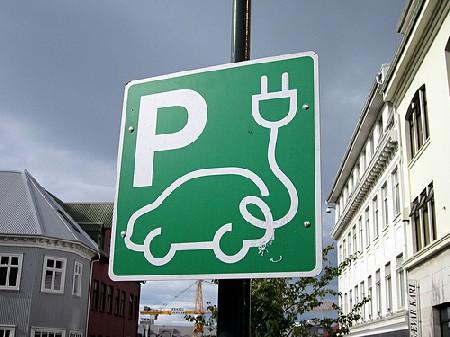
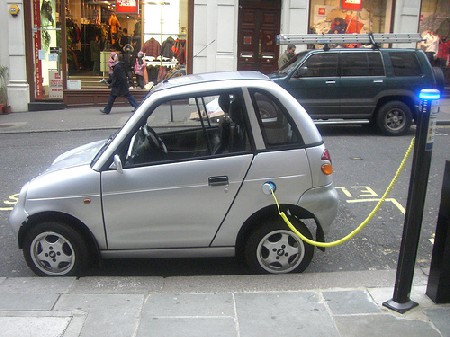
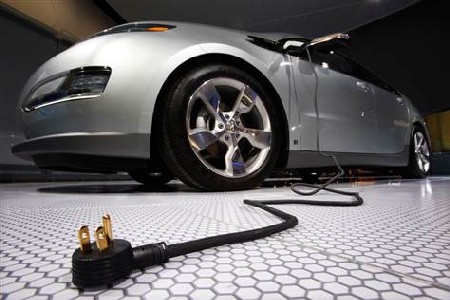

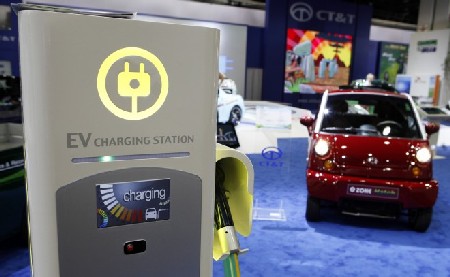
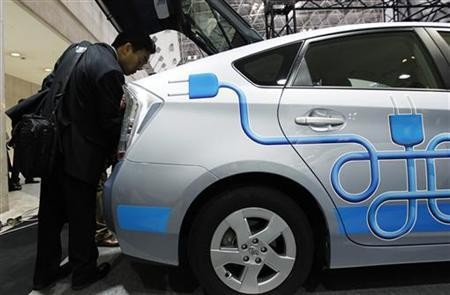
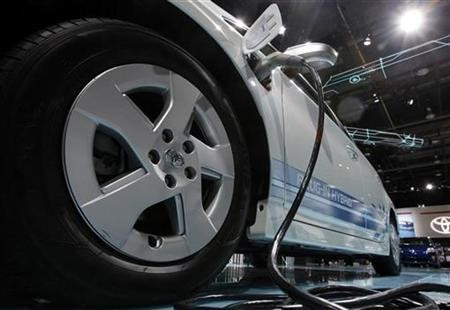
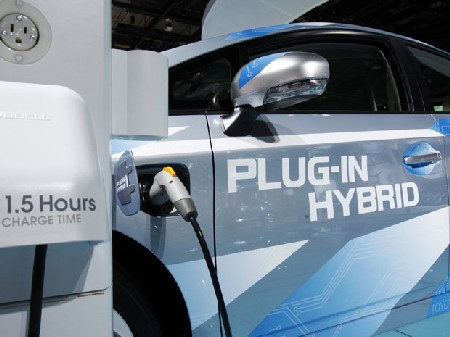


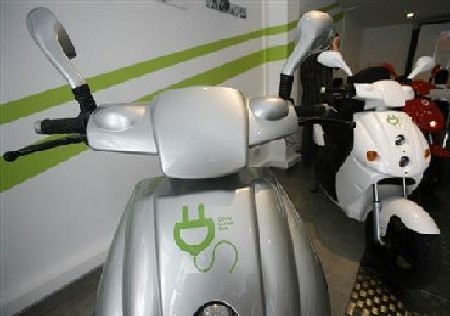
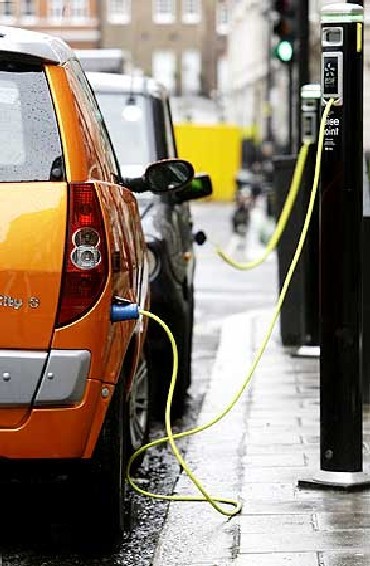

article